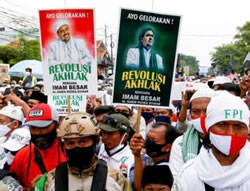 The Indonesian Government has introduced new selection procedures for Public Servants which it hopes will stem the flow of workers into the bureaucracy who hold extremist views.
The Indonesian Government has introduced new selection procedures for Public Servants which it hopes will stem the flow of workers into the bureaucracy who hold extremist views.
Revised testing will gauge a candidate’s commitment to the national ideology, respecting other religions and nationalism.
The move has received the backing of the Catholic Church.
Indonesia has more than 4.3 million Public Servants and at least 800,000 have been influenced by radical ideology, according to the Ministry of Administrative and Bureaucratic Reform.
Public Servants were among those arrested for involvement in two suicide bombings at three churches in Surabaya, East Java Province, in 2018 and a cathedral in Makassar, South Sulawesi Province, this year.
The Ministry said that on average it dismissed 40 Public Servants each month because they had connections with radical groups linked to terror organisations such as Jemaah Islamiyah, an al-Qaeda affiliate, or the Islamic State-supporting Jamaah Ansharut Daulah.
It said it hadalso dismissed those who joined banned hard-line groups such as Hizb ut-Tahrir Indonesia and the Islamic Defenders Front.
Spokesperson for the Ministry, Katmoko Ari Sambodo said that previously, selection tests concentrated on character and intelligence, but did not delve into beliefs, which was why extremism had infiltrated the Public Service.
“The anti-radicalism test aims to examine them on their patriotism, the national ideology of Pancasila [Five Principles], and tolerance towards others,” Mr Sambodo said.
Executive Secretary of the Indonesian Bishops’ Commission for the Laity, Paulus Christian Siswantoko backed the move.
“The Civil Service must be totally free of radicalism. We want people loyal to national ideology and the expulsion of those who work against it,” Father Paulus said.
Jakarta, 20 June 2021



